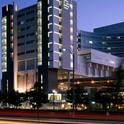Background:Pressure-strain loop analysis is a novel echocardiographic technique to calculate myocardial work indices that has not been applied to patients with apical hypertrophic cardiomyopathy (ApHCM). We hypothesized that myocardial work indices differ between patients with ApHCM and those with non-apical HCM (non-ApHCM). This study aimed to (1) evaluate myocardial work indices in patients with ApHCM compared to those with non-ApHCM, (2) describe associations with relevant clinical variables, and (3) examine associations with significant late gadolinium enhancement (LGE) on cardiac magnetic resonance imaging (CMR).
Methods: We retrospectively identified 48 patients with ApHCM and 69 with non-ApHCM who had measurements of global longitudinal strain (GLS), global work index (GWI), global constructive work (GCW), global wasted work (GWW), and global work efficiency (GWE). We evaluated available CMR data on 34 patients with ApHCM and 51 with non-ApHCM. Multivariable regression models correcting for traditional cardiac risk factors were used to evaluate the associations of myocardial work indices with relevant clinical variables.
Results: Median GLS (-11% vs -18%, p < .001), GWI (966 mmHg% vs 1803 mmHg%, p < .001), and GCW (1050 mmHg% vs 1988 mmHg%, p < .001) were significantly impaired in patients with ApHCM compared to those with non-ApHCM. Increasing NT-ProBNP, abnormal ultra-sensitive troponin, and increasing maximal LV wall thickness were significantly associated with reduced GWI and GCW in patients with ApHCM (p < .05). GCW had only modest accuracy (AUC 0.70) to predict LGE in patients with ApHCM. However, in patients with non-ApHCM, GLS was the strongest predictor of LGE (AUC 0.91), with a -17% cutoff yielding 81% sensitivity and 80% specificity.
Conclusions: Myocardial work indices are significantly impaired in patients with ApHCM compared to those with non-ApHCM and correlate with important clinical variables. GLS, GWI, and GCW are more strongly predictive of fibrosis in patients with non-ApHCM than ApHCM.

Aurora Cardiovascular and Thoracic Services, Aurora Sinai/Aurora St. Luke's Medical Centers